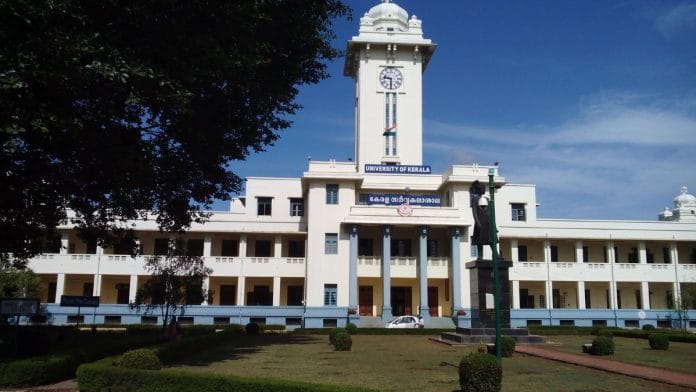Thiruvananthapuram: In 2016, when the Oommen Chandy government was considering allowing private universities in Kerala, the opposition from the Left Democratic Front (LDF) and its affiliated organisations was so fervent that a protester even slapped then executive vice-chairman of Kerala State Higher Education Council T.P. Sreenivasan on the face.
Nearly 9 years later, marking a visible deviation from its earlier principle, the Communist Party of India (Marxist)-led LDF government has cleared a draft bill to the effect.
The Kerala State Private Universities (Establishment and Regulation) Bill, cleared by the state cabinet Monday, allows private universities to set up their campuses in Kerala provided they adhere to state policies, including a scholarship or a fee waiver for Scheduled Caste and Scheduled Tribe students and 40 percent reservation for students from the state, among others. It will be presented in the ongoing assembly session.
Political analyst C.R. Neelakandan said the Left has been deviating from its political ideologies to appease the middle-class votes for a while now.
“Whatever issues they raised in 2016, they still haven’t changed. Only the Left has changed now,” Neelakandan told ThePrint, adding that Communist parties think their ideology has lost its relevance in today’s state.
Senior Congress leader C.C. Sreekumar said the LDF should issue a public apology to T.P. Sreenivasan before endorsing private universities in Kerala. Students’ Federation of India (SFI), the student wing of the CPI (M) was behind the physical attack on T.P. Sreenivasan, near the venue of the Global Education Meet in Thiruvananthapuram. They accused the official of handing over Kerala’s higher education sector to private players.
“CPM knows that their ideologies are very behind the times and they are struggling as they have lost their relevance in today’s world,” Sreekumar told ThePrint.
Kerala Higher Education Minister R. Bindu told media Tuesday that SFI or the party doesn’t need to apologise for its 2016 protest, adding that the government has carried out extensive deliberations while preparing the bill.
“Compared to other states, in Kerala, the private university system will have much more social control,” she said, adding that the bill was supported by all the members of the cabinet, though the CPI had some requests for revisions to ensure transparency.
“Almost all states in India have private universities. We have completed three decades of globalisation. Society has also become much more competitive. If we want to survive as a society, we need to change as time demands,” Bindu said.
Also Read: From Davos pavilion to ‘masala bonds’, LDF pulls out all stops to separate ideology from investments
Kerala’s road to accepting private universities
According to the All Kerala Higher Education Survey 2021-2022, published in March 2024, of the 25 universities or institutions functioning in Kerala, 15 are state-run, one is a central university, 3 are deemed-to-be universities, and 6 institutes of national importance along with few standalone institutes are directly controlled by state or central government.
The report further said that Kerala has a total of 1,181 colleges—of which 202 are under the government, 763 are private, and 216 are government-aided colleges—and they are all affiliated to its state universities. The state has no private universities.
In 2015, then chief minister and United Democratic Front (UDF) leader Chandy said his government would explore the feasibility of setting up private universities in Kerala to make it an “international education hub”.
In September that year, a committee led by Kerala’s M.G. University professor Cyriac Thomas submitted a report on the feasibility of establishing private universities in Kerala to the government. The report said that the spread of modern education elsewhere and the lack of high quality higher and professional education was pushing Kerala youth to migrate to other countries and neighbouring states.
Private universities, it said, have a definitive role in providing financial resources to a state and it can be invested in improving the quality of education and increasing the Gross Enrolment Ratio of students.
The LDF and its affiliated organisations fought against this proposal tooth and nail. The All-Kerala Private College Teachers’ Association (AKPCTA), a teachers’ association with links to the LDF, reportedly alleged many of the private universities in other states were functioning in violation of the University Grants Commission’s regulations.
However, the LDF changed its stance in 2023.
That year, during the Thrissur leg of Chief Minister Pinarayi Vijayan’s outreach programme ‘Nava Kerala Sadas’, he said his cabinet was actively considering a bill to allow private universities in Kerala to “match” the need of the times.
Under the current draft bill, a sponsoring agency, which has credibility and experience in the field of education, can apply to set up the university in Kerala.
The guidelines further state that the institution should deposit Rs 25 crore corpus fund in the state treasury and should have the necessary land to start the establishment. If the institution is multi-campus, at least 10 acres are required for its centre.
The institution should also adhere to state and UGC guidelines for matters of university administration and appointment of teachers and vice-chancellor. 40 percent of the seats will be reserved for permanent residents of Kerala and the university should also maintain the existing scholarship/fee waiver for SC/ST students.
(Edited by Sanya Mathur)
Also Read: Kerala budget brings hikes in taxes & levies amid fiscal deficit crisis






